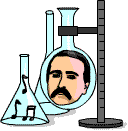Alexander Porfir'yevich Borodin - Scientist and Composer
Created | Updated Mar 18, 2003

Alexander Borodin (12 November 1833 - 27 February 1887) was an incredible man. Not only was he a world-class scientist - indeed, this is what he is remembered for in parts of Russia - but he also was a composer with a great feel for the orchestra, and all the tones of the different sections and different instruments. This is used to great effect in his work, and it is as a composer that he is known in the West.
Borodin's Origins
Borodin was the illegitimate son of a prince, Prince Ghedeanov. As was the custom in the 19th Century, he was registered as the child of a serf in the prince's employment, Porfiry Borodin. He was born and brought up in St Petersburg and he graduated with honours from the Academy of Medicine in St Petersburg in 1856, and by 1864, he was a professor of organic chemistry at the same establishment. Later on in his life, he also founded a school of medicine for women. Throughout his youth, he was interested in music, and he played piano.
How Borodin was Inspired
Had events not turned out as they did, he might not have turned into the composer that he eventually became, but in his late 20's he met the great Russian composer, Belakirov. It was this charismatic man that inspired Borodin. Later on, he was to be remembered as a member of 'The Five', the most important member of which was Belakirov himself.
The Five
'The Five' ( also known as the 'Inspired Dilettantes' or the 'Mighty Handful') were so named by a Russian music critic, Vladimir Stasov. They were:
- Balkirev
- Borodin
- Cui
- Mussorgsky
- Rimsky Korsakov
Their style was principally 'nationalist', and it was for this reason that a lot of folk songs and traditional music featured in their work. The forerunner of the five, Glinka, was a main influence on all of them.
Nationalist Music
There was a great trend in nationalist music during the time of Borodin. Other nationalist works include The Great Gate of Kiev, and much of the work of Elgar. Nationalist music obviously tends to have a strong emphasis on patriotism and ends up being intrinsically associated with the country in question, or the particular landscape of that country. One example that will be familiar with English audiences is the tune Land of Hope and Glory, a strongly patriotic piece by Elgar.
Science and Music
Since Borodin was principally a scientist1, Many of his scores were also left very chaotic and incomplete, and several were re-written and completed by friends of his - principally Rimsky-Korsakov - but others as well. Most notably, his work Prince Igor was left incomplete at death, and Rimsky-Korsakov finished this. In the process, Rimsky-Korsakov absorbed much of Borodin's style, and used it in his later works.
In accordance with his training, his first published scientific work was a paper 'On the action of Ethyl Iodide on Hydrobenzamide and Amarine' and his first tour of Europe was as a scientist for the purposes of 'scientific study'.
A chronology of Borodin's life
| 1833 | Born (St Petersburg) to a prince, but named after a serf, since he was illegitimate. |
| 1856 | Graduated with honours from the Academy of Medicine in St Petersburg. |
| 1862 | Met Balakirev for the first time. |
| 1863 | Married Ekatarina (Catherine) Protopopova, a pianist and admirer of both Schuman and Wagner. This exerted an influence on Borodin. |
| 1864 | Professor in the Academy of Medicine. |
| 1870s | Worked on two string quartets and In the Steppes of Central Asia. |
| 1876 | Finished his Symphony No. 2 |
| 1877 | Visited Germany for scientific study and met Liszt, who exerted a large influence on him. |
| 1879 | The dances - Polovtsian dances - from Prince Igor were premiered. |
| 1880 | In the Steppes of Central Asia finished. |
| 1881 | String Quartet No. 2 finished. |
| 1885 | Petite Suite for Piano and Scherzo in Ab finished. |
| 1887 | Borodin died suddenly - he dropped dead of a burst artery at a party in St Petersburg. |

